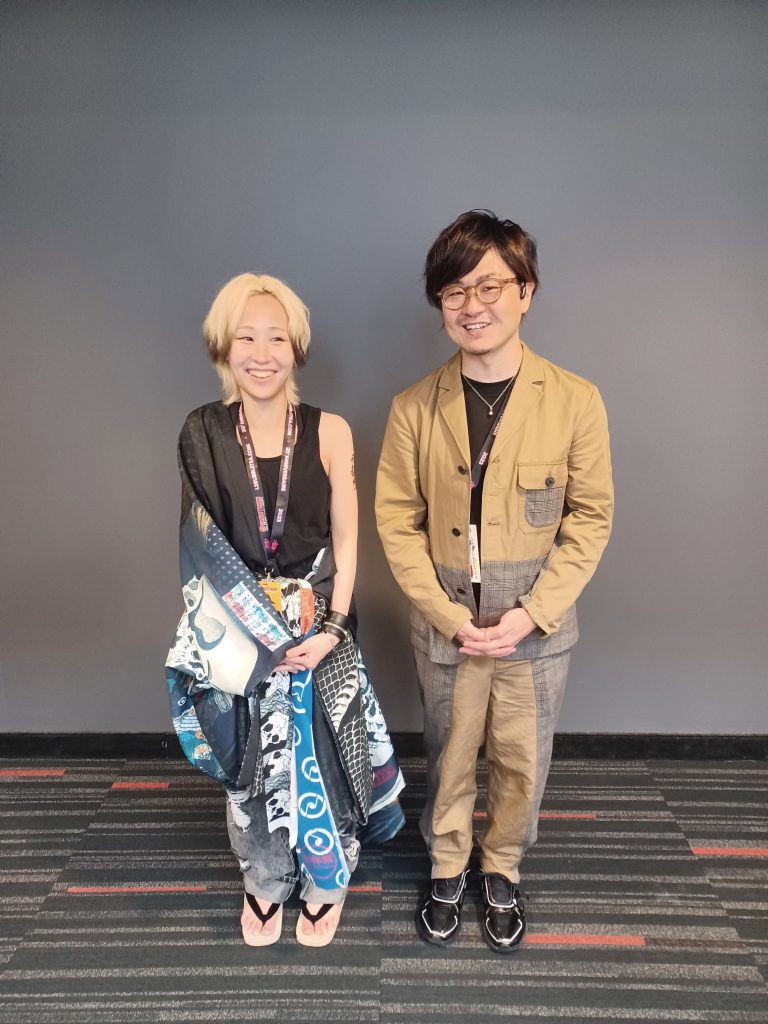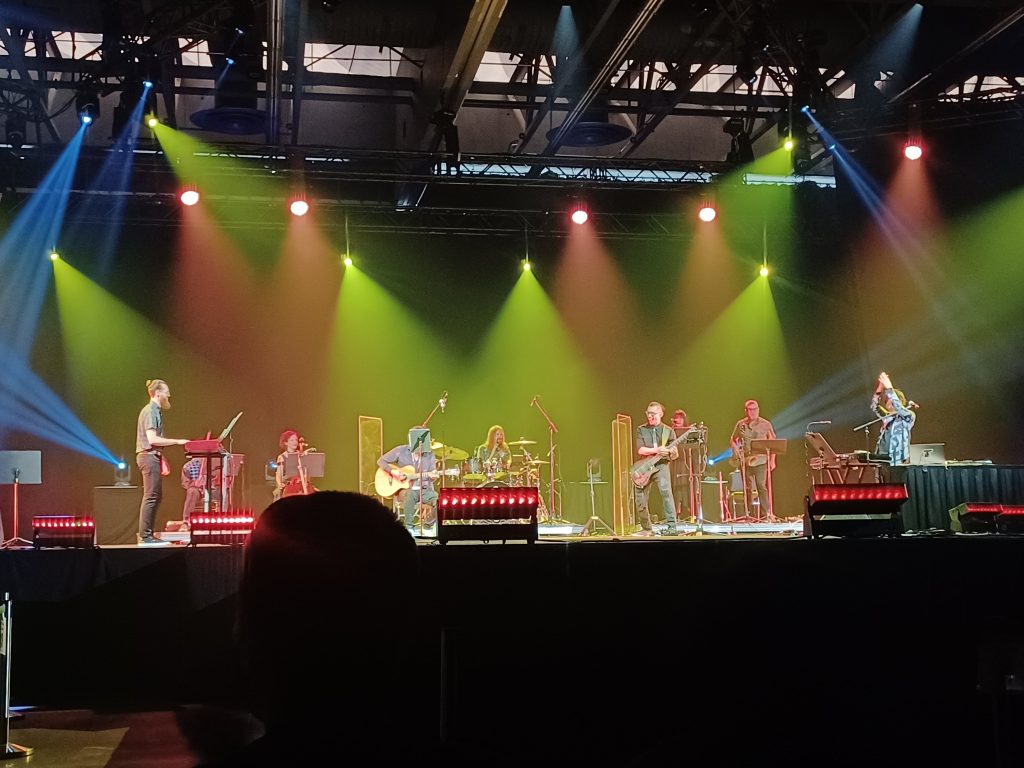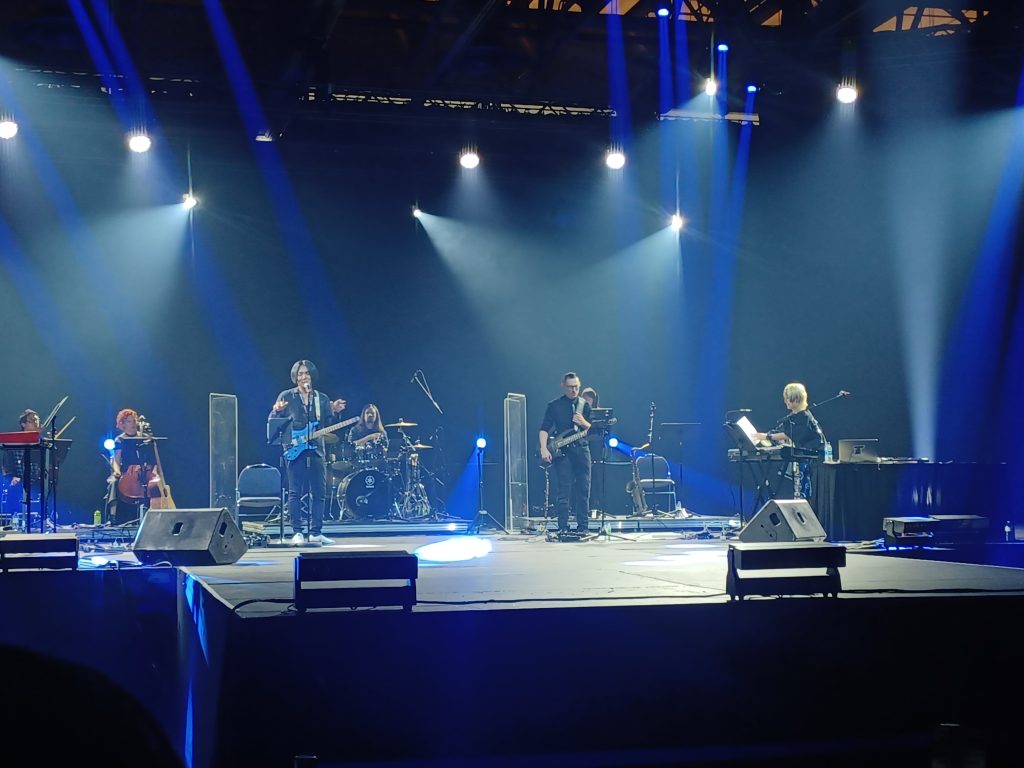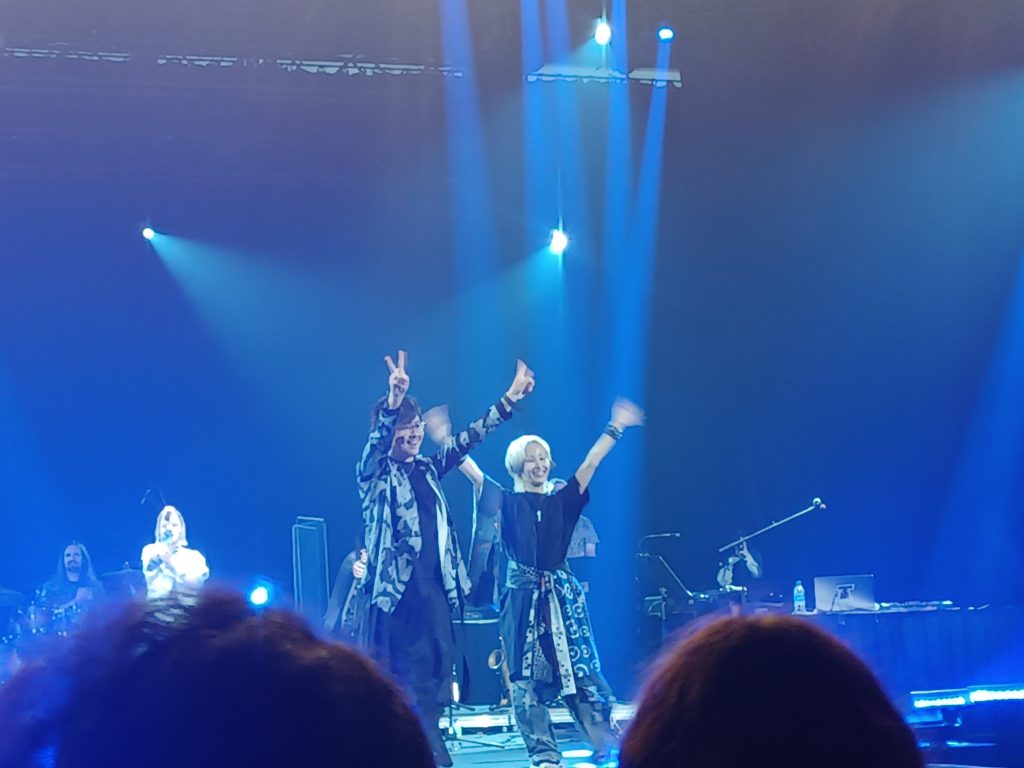Takahiro Obata and Alisa Okehazama are two big names in the world of anime music. With titles like The Promised Neverland and Jujutsu Kaisen under their belt, you are probably familiar with their work, even if you haven’t heard of them before. As someone who loves the anime they have been involved with, I was surprised–and quite happy–to hear that they would both be attending Otakuthon this year.

Despite Obata and Okehazama never having collaborated before, they happily performed a concert together at Otakuthon this year. Each composer worked magic in their own set, with Okehazama focused on hyping up the crowd and creating more explosive EDM drops, while Obata’s songs featured more fusion jazz and solo improvisations. Ultimately their dynamism and the epic, bombastic nature of some of their most well-known songs led to a fairly cohesive concert, which clearly struck a chord with the hundreds of fans who attended. I was lucky to be able to interview them jointly, with Maho Azuma serving as an interpreter.
ImaginAtlas: What are some of your musical inspirations? What made you want to do music professionally, and what drew you to certain genres?
Takahiro Obata: My sister used to play piano, so we had an upright piano in our house. I used to dabble on it, and later on in life, I started studying music. As for my involvement with jazz, there is also an instrument, similar to the Melodica—called an Electron—which I enjoyed playing with. I also love the game Chrono Trigger. There was a festival which featured covers of the game’s soundtrack in big band style, and I played with some of the tracks for a submission. I was impressed by how you can create an entire world out of one piece of sheet music through improvisation.
Alisa Okehazama: In my neighbourhood, there was an older, very fashionable lady who taught music; her lessons got me into the piano, which was my first instrument. As for my music, I was attracted to EDM as a genre because a lot of people can get together and have fun. The high energy is so much fun, so I naturally gravitated towards it.
ImaginAtlas: Mr. Obata, your preferred style of music is jazz. How are you planning to bring improvisation into the concert at Otakuthon?
Obata: Rather than thinking of how improvisation is incorporated into the concert specifically, I write improvisation into all of my pieces. It is part of my style, so it will be present in the pieces played at the concert.
ImaginAtlas: What is your composition process like? What kinds of programs do you use, and what is your routine?
Obata: I use a program called Studio One. As for my process, it really depends on the request of the music I am asked to write. I play piano professionally, and with 88 keys, I have a lot of choices of what to do. I often overcomplicate my melodies because there are too many options. So instead, I will force myself to play a melody using only one finger so I can develop a good melody that isn’t overly complex, and then build the rest of the piece around it.
Okehazama: I also use Studio One. I usually go in with the percussive parts first. Since my songs are so hype-heavy, I begin with the drum set. If there is no drumming, I will go in through piano, but usually, I pick a tempo first and then work on a rhythm section which matches it.
ImaginAtlas: Both of you have worked on some very famous and well-known anime, some of which have been adapted from manga. Do you read these manga before composing, or do you focus more on prompts from directors and producers?
Obata: I loved anime and manga to begin with. If it is a title I [have] already read and I get the offer, I am excited, and it feels amazing to work on that anime. If it is a manga I have not read, then I would still like to read the original manga, but it really depends on the time because I can be on a tight schedule. However, I typically read a lot of the manga.
Okehazama: I love manga too, and I read most of the manga before I even get the offer [to make] music for an anime. I base a lot of my work on the drawing style of the manga. Sometimes there is a clean, pop edge; sometimes, there is a rough edge which is sloppy but cool. Either way, the art inspires me to write the music.

ImaginAtlas: What are some of your favourite manga and anime? What genres are you drawn to?
Maho Azuma (Interpreter): They both love anime a lot, and they have so many titles to think about. They grew up watching the big shows that have become standard these days, like Naruto and One Piece, so those anime are obviously very dear to their heart.
Okehazama: Aside from some classics, I also recently started getting into Dr. Stone.
Obata: I love many genres. However, in terms of music, I get most of my requests for [music composition] from the mystery and suspense genres, and they fit well with my compositional style.
ImaginAtlas: What is the process of planning the music for a larger work, such as an entire season of an anime or a video game?
Obata: It largely depends on the source material. Let’s say there is a central theme in an anime; you can create a central theme for that plot point and then use parts of that main theme to construct the other pieces within [the soundtrack], so there is a sense of cohesion around one central motif/plot line.
ImaginAtlas: That’s fascinating! In continuing with this topic, Okehazama’s online profile for Otakuthon states that she works hard to capture the world of a story in the music. How do you focus on creating that ambiance?
Okehazama: I really think hard about the instruments that are used. Choosing a specific instrument gives a certain feeling of the worldview. For example, in Jujutsu Kaisen, the world is spooky and there are lots of monsters and demons. So rather than using one pitch, I bend the pitch to give the sound an uncomfortable feeling. For a happier anime, I will use toy instruments like a recorder. No matter what, I make sure I stay close to the core essence of the anime.

ImaginAtlas: Both of you have worked on anime set in fantasy universes, such as Jujutsu Kaisen and The Promised Neverland. Is there any difference in the composition of the soundtracks? How do you explore fantasy through your music?
Okehazama: It is complicated. For me, in Japan, real life feels like a smaller world, as opposed to fantasies which have a very expansive open world setting that has a lot to explore and build on. So if I am writing for something like Jujutsu Kaisen, which takes place in normal human society and has curses and abnormalities, it is almost liberating. I get to use the same instruments I would for a realistic soundtrack, but I change them to twist the sound and play with the pitch to create something different.
Obata: The beginning of The Promised Neverland takes place in 18th-century Europe. When you are first watching the show, you don’t get the sense it is fantasy oriented until you get introduced to the demons, and everything grows rapidly from there. Going with that feeling, a lot of the instruments I used in the beginning were orchestral. Then later, I would still use instruments like the violin, but use an extended technique—such as playing on the bridge—which is not used in a classical setting. By adding these layers to the pieces, I got to create my own little dystopian world, keeping the realism but also incorporating fantasy.

ImaginAtlas: What drew you to the Otakuthon and to Montreal?
Obata: Honestly, being invited was an honour for me. I was very excited to receive the offer. I haven’t been able to go out much during COVID, and getting to go overseas is a big deal. I also heard stories about how outside of Japan anime is blowing up, but when you are in Japan, you don’t actually see the influence you have on the rest of the world too much, so I wanted to go abroad and see the energy and passion people have towards anime. I was looking forward to seeing and physically feeling this while I am in Canada.
Okehazama: I was really drawn towards the unknown. I wasn’t sure who would know my works outside of Japan or how popular I would be. All of it is unknown, so going somewhere so far away from Japan and seeing people who like my work and knowing the level of interest was something that really drew me here.
Takahiro Obata and Alisa Okehazama performed together again along with artists such as Makoto Miyazaki and Yasuharu Takanashi on September 16th as part of the Kyoto Soundtrack Festival. One can only hope they will continue doing live shows, either together or separately; their contributions to anime are plentiful and multifaceted, and translate wonderfully on the stage.
